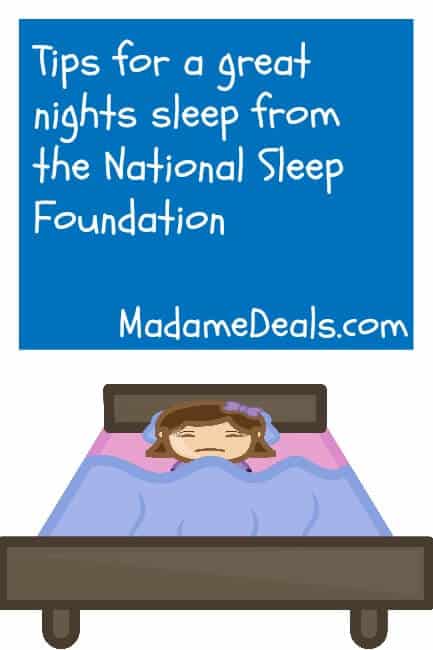Tips for a Great Nights Sleep from the National Sleep Foundation
Tips for a Great Nights Sleep from the National Sleep Foundation
This is a Type-A Parent paid post to discuss sleep issues, and to share a new insomnia resource from the National Sleep Foundation.
I don’t know about you guys, but sometimes it’s hard for me to fall asleep and stay asleep at night. It hasn’t always been this way, I used to be able to fall asleep within 5 minutes of my head hitting the pillow, and sleep all night until my alarm went off the next morning. I think I know what happened too, I think it was the cute little girl sitting across from me happily playing video games. Ah yes, being a parent can wreak havoc on your sleep pattern, am I right Moms!? (And Dads!). Not that I would change that for the world, but it can be frustrating when you are tired but instead of sleeping, you are going over what all has to be done tomorrow in your head.
I have found that the busier my week is, the less sleep I tend to get. Now why is that? According to the National Sleep Foundation, Insomnia and Anxiety have a lot to do with each other. Worrying about past or future events can make it hard to fall asleep at night, and to stay asleep. I know when I have something important to do the next day I am terrified of sleeping through my alarm so I end up waking up over and over to check the time.
Do you have a hard time falling asleep or staying asleep? Check out what might be causing it:
So the question is, what can we do to get a better nights sleep?
That is where the National Sleep Foundation comes in! It is an awesome online resource with great tips for getting a good nights sleep. I wanted to share some of the tips I found on the National Sleep Foundations Website that have worked for me, and some that might work for you!
Tips for falling asleep from the National Sleep Foundation
- Carve out at least 30 minutes of wind-down time before bed in which you do something relaxing, such as read a book. Dim the lights in the house slightly for an hour or so before bed. (This is something that is a must do for me!)
- Disconnect from close-range electronic devices such as laptops, phones, and tablets, as the light from their screens can alert the brain and make it harder to fall asleep. (I turn my cell phone upside down, so that way the light from an alert doesn’t upset my sleep)
- In order to calm your mind, do a breathing or relaxation exercise. (A little light Yoga right before bedtime works wonders for me!)
- If you get into bed and cannot fall asleep after 20 minutes, get up and return to another space in the house to do a relaxing activity, such as reading or listening to music. Lying in bed awake can create an unhealthy link between your sleeping environment and wakefulness. Instead, you want your bed to conjure sleepy thoughts and feelings only. (This is something I plan on trying next time I’m having a hard time falling alseep!)
- Wake up at the same time every day. Even if you have a hard time falling asleep and feel tired in the morning, try to get up at the same time (weekends included). This can help adjust your body’s clock and aid in falling asleep at night. (I wake up no later than 7 am every day of the week if I can!)
Tips for getting back to sleep at night from the National Sleep Foundation
- Avoid caffeine in the afternoon and evening, and alcohol close to bedtime. These can promote wakeups during the night.(The rule in our house is no caffeine after 5 pm)
- Make sure your sleep environment is quiet and dark throughout the night. Use darkening shades to block streetlights and early morning light, and a fan or noise machine to block sounds. (We have installed darkening shades and noise machines in my room and my daughters)
- Practice a simple breathing exercise. (Meditation is always a great way to relax!)
- If you are unable to fall back asleep for 20 minutes do not lay in bed and worry about not sleeping, get up and go to a space in the house to do a relaxing activity, like reading, with dim light. (Reading is one of my favorite ways to relax before bedtime!)
Be sure to check out a new resource from the National Sleep Foundation at sleepfoundation.org/insomnia – a good place to start if you think you have insomnia or aren’t sleeping. The National Sleep Foundation is your trusted resource for everything sleep – understanding how sleep works & why it’s important, learning healthy habits, creating a relaxing bedroom & bedtime routine, & finding solutions to your sleep issues.

Cook, Baker, Phototaker, Fitness Mover and Shaker, Cupcake Tester, Deal Maker, Adventurous Undertaker, Do Good “Deeder”, Teacher, Mom, Wife, Patriot for Life & Giver of Good Advice – RealAdviceGal







